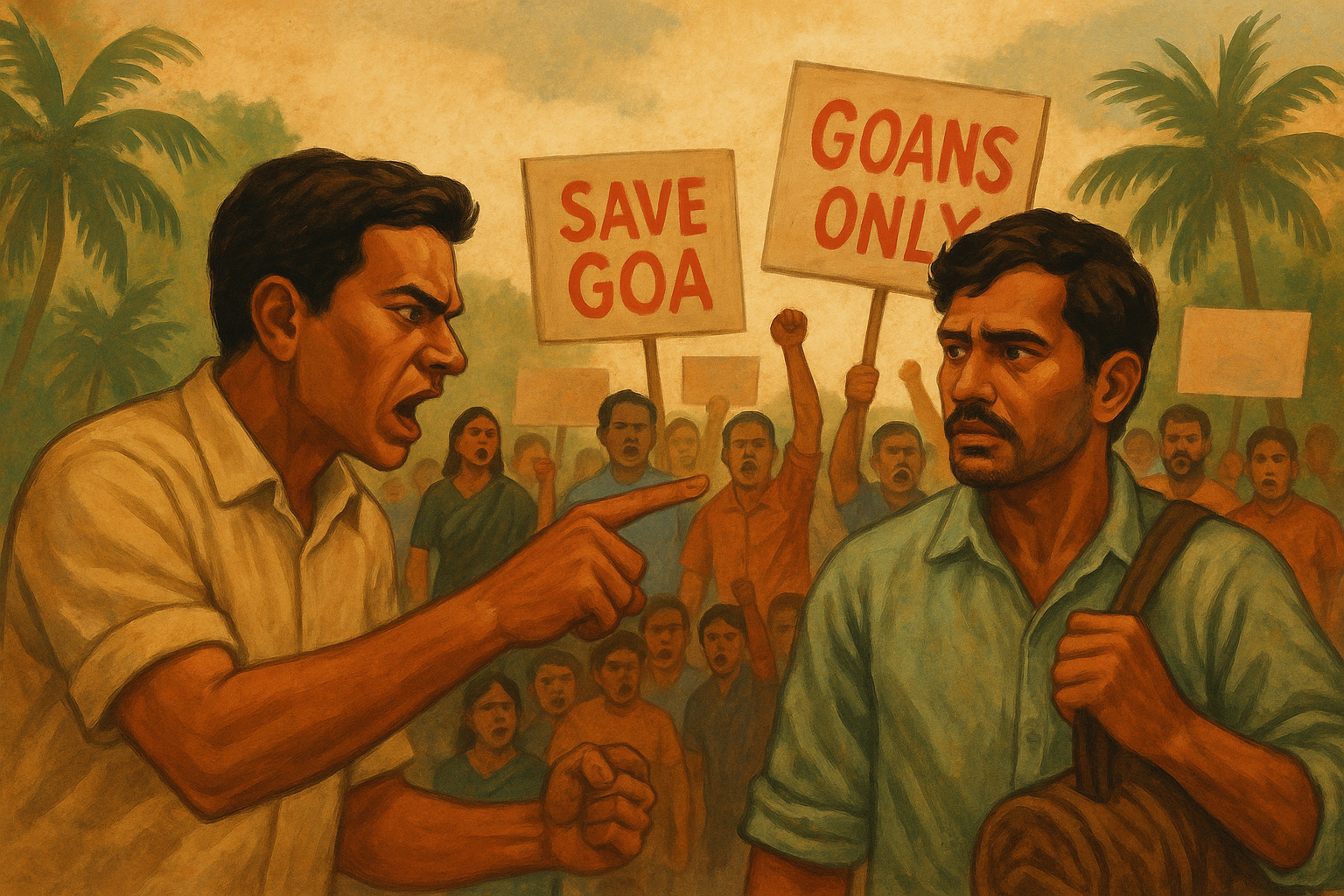Goa is changing. Fast. Villages are becoming towns. Towns are becoming concrete. Rent is soaring. Locals feel outnumbered, sidelined

There’s a shift in the air. A new kind of frustration — spoken in hushed tones, loud rallies, WhatsApp rants, and meme wars. And at the centre of it? One word. Ghanti.
What was once a neutral reference to people from the Ghats has now become a slur. An insult. A way of saying: “You don’t belong here.”
As a Goan, I get the frustration. I see the cracks forming. But I’m also worried — deeply — about the road we’re heading down. Because the more we use this word to divide, the more we lose the very Goa we say we’re trying to protect.
What are we really saying when we say ‘Ghanti’?
Let’s not pretend it’s harmless. Today, ghanti isn’t just about origin. It’s about exclusion. It’s used to describe anyone who doesn’t “look”, “speak”, or “act” Goan enough. Migrant workers, domestic helpers, vendors, builders — the same people we depend on every single day — are being shoved under this label. They build our homes. Drive our cabs. Cook our meals. Clean our cities. Repair our roads. Run our fishing boats. We rely on their labour, yet mock their presence. It’s not just hypocritical — it’s dangerous.
Yes, Goa is changing. But so are the stakes
Let’s not sugarcoat this either — Goa is changing. Fast. Villages are becoming towns. Towns are becoming concrete. Rent is soaring. Locals feel outnumbered, sidelined. Cultural dilution feels real. And in the middle of all this, there’s growing anger that the identity of Goa is slipping away.
These aren’t imaginary fears. They’re coming from real experiences. But if we respond with hatred, slurs, and gatekeeping — are we really fixing anything? Or just building taller emotional walls that hurt us more than anyone else?
Crime, chaos, and the facts we can’t ignore — or abuse
Let’s talk about the stat people keep whispering: more than 70% of crimes in Goa in recent years have involved migrants. That’s not an opinion — it’s fact. And yes, that’s alarming. But here’s the part many leave out: these numbers are as much about poor regulation as they are about individuals.
Why are illegal constructions still happening unchecked? Why are background checks not mandatory? Why are some landlords and contractors allowed to bring in workers without registering them? Why are authorities not enforcing tenant verification across the board?
This isn’t just a “migrant problem”. It’s a governance problem. Blaming entire communities only makes things worse. It pushes good people into the shadows, breaks trust, and makes the real offenders harder to find. Want Goa to be safer? Regulate better. Enforce smarter. Hold everyone — including us — accountable.
And let’s not forget — Goa runs on tourism
Here’s what we often ignore while debating “outsiders”: Goa survives on its image. Tourism is our backbone. From beach shacks to heritage homestays, from taxi drivers to shack boys — everything depends on how the world sees us.
If Goa becomes known as a place where people are insulted for how they look, where they’re from, or what language they speak — we don’t just lose our charm. We lose jobs. We lose investment. We lose Goa’s soul. You can’t sell paradise if it looks like it’s pushing people away.
So what do we actually do?
The answer isn’t to stay silent. But it’s also not to shout the loudest insult. Here’s what a real solution looks like:
- Mandatory registration for tenants and workers. Know who’s living where — simple, effective.
- Fair wages and proper contracts. Protect workers and stop exploiters.
- Tenant vetting and background checks. Safer neighbourhoods for all.
- Cultural integration. Language classes. Community events. Break the ice instead of building walls.
- Goan youth empowerment. Prioritise locals in job creation, housing, and education — without attacking others.
This isn’t soft. It’s smart. It’s structured. It’s what real leadership looks like.
This is not about blaming Goans
Let me be clear — this is not an attack on Goans. I am Goan. And I understand why people are hurt, scared, and angry. This land is precious. Our culture is fragile.
Our voices have often been sidelined by the powerful, the wealthy, the outsiders who don’t care about our roots. But when we turn that anger downward — towards poor workers, domestic helpers, construction hands — we’re not protecting Goa. We’re only weakening it.
Ghanti is just a word. But it can wound deep
Words matter. The more we normalise using ghanti with hate, the more we chip away at our own identity. Goemkarponn is about pride — not prejudice. It’s about community — not exclusion. It’s about strength — not slurs. We can’t become a state where dignity depends on your birthplace. That’s not Goan. That’s not us.
This is a crossroad — Not a crisis
Goa’s in flux. That’s undeniable. But we still have the choice — right now — to steer this ship right. We can choose smart governance over cheap blame. We can choose regulation over resentment. We can choose dignity over division.
And most of all, we can choose to be Goan — in spirit, in behaviour, and in how we treat others. Because if we lose that? Then we become the biggest threat to the Goa we love.